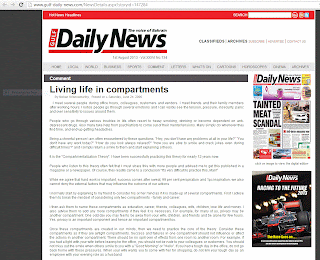Compartmentalization Theory
I meet several people during my office hours, colleagues, customers and vendors. I meet several friends and their family members after working hours. I notice people go through several emotions and I can visibly see the tension, pressure, insecurity, panic and over sensitivity to the issues around them.
People who go through various troubles in life often resort to heavy smoking, drinking or become dependent on anti-depressant drugs. Also many take help from Psychiatrists to come out of their mental tensions. Many simply cry whenever they find time, end-up in getting headaches.
Being a cheerful person I am often encountered by these questions, “Hey, you don't have any problems at all in your life?”, “You don't have any work today?”, “How do you look always relaxed?”, “How you are able to smile and crack jokes even during difficult times?” and I simply return a smile to them and start explaining a theory.
It is the “Compartmentalization Theory”. I am successfully practicing this theory for nearly 12 years now.
People who listened to this theory often felt that I must share this with more people and advised me to get this published in a magazine or a newspaper. Of course, they readily came to a conclusion “It’s very difficult to practice this, Man!”
While we agree to the philosophies hard work is important, success comes after sweat, 99% perspiration and 1% inspiration, we also cannot deny the external factors that may influence the outcome of our actions.
I normally start by explaining to my friend to consider his or her mind as if it is made-up of several compartments. First I advise them to break the mindset of considering only two compartments – Family and Career.
I then ask them to name these compartments as Education, Career, Friends, Colleagues, Wife, Children, Love life and Money. I also advise them to add any more compartments if they feel it is necessary. For example, for many of us, privacy may be another compartment. One odd day you may feel to be away from your wife, children, and friends and be alone for few hours. Yes, privacy is an important component and hence an important compartment too.
Once these compartments are created in our minds, then we need to practice the core of this theory. Consider these compartments as if they are air-tight compartments. Success and failures in one compartment should not influence or affect the actions in another compartment. There should be no spillover of effects from one room to another room. For example, if you had a fight with your wife before leaving for the office, you should not be rude to your colleagues or customers. You should not miss out the smile when others smile to you with a “Good Morning” or “Hello”. If you had a tough day in the office, do not go back to home with these pressures. When your wife wants you to come with her for shopping, do not link your tough day as an employee with your evening role as a husband.
These are two different actions, independent of each other, happened in two different compartments, Career and Family. By letting the tensions, pressures, irritations and frustrations intermingle; you end-up in doing no justice to either of these roles.
Though it is difficult to practice, a conscious effort to practice this can definitely bring a change in your life. Try this out and definitely you will write me back soon saying how happy you are now.
~Mohan Krishnamurthy
http://www.gulf-daily-news.com/NewsDetails.aspx?storyid=147284


No comments:
Post a Comment